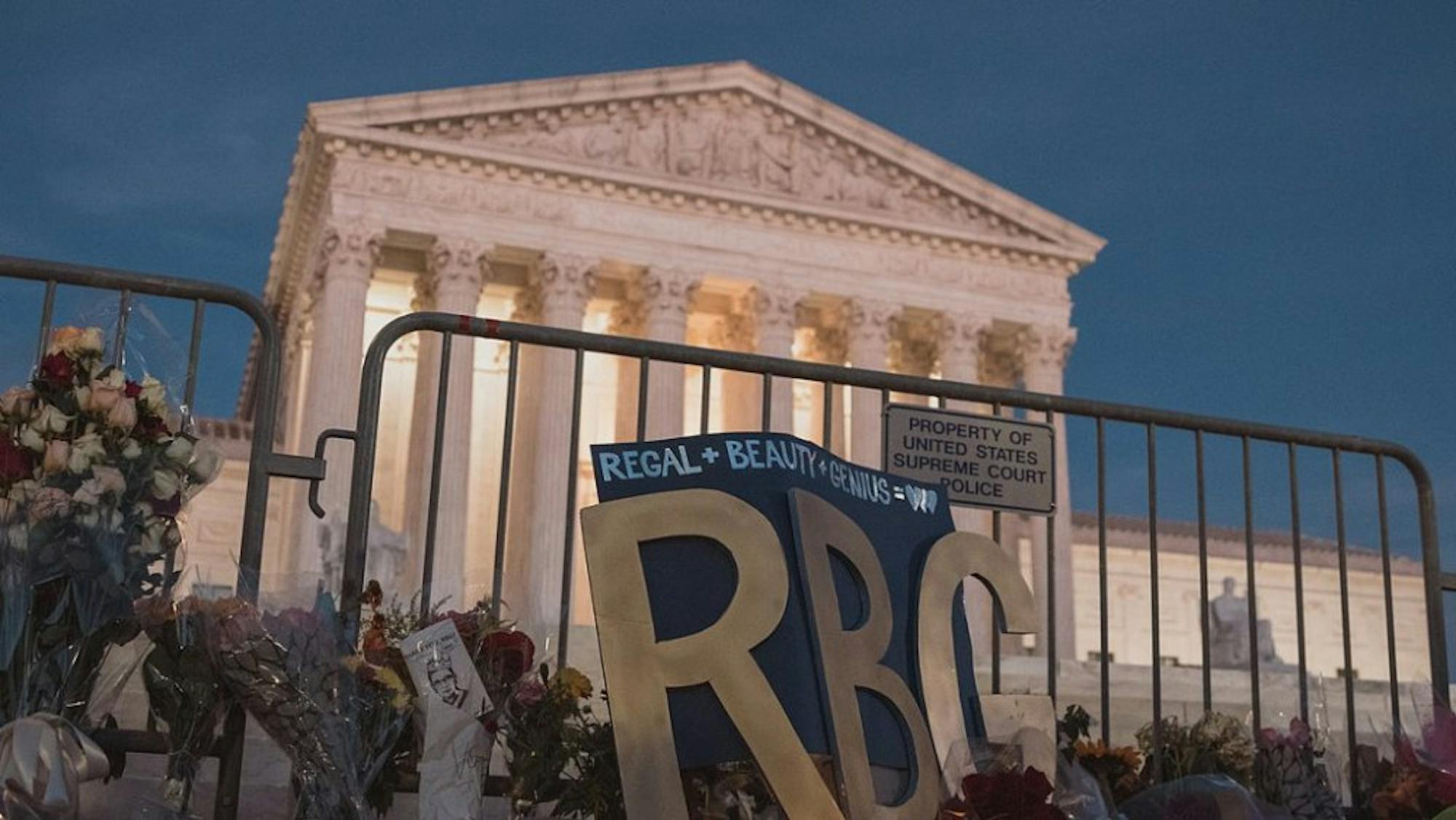Not many members of the American judiciary ever become celebrities. Justice Ruth Bader Ginsburg was quite the exception, and the extent to which the nation has grieved her death is a testament to that. Throughout her 27-year tenure, she single-handedly reshaped American law, issuing famously scathing dissents and establishing enduring precedents. She made the U.S. a better place. Many politicians, however, seemed to forget that in the hours after her death.
That very night, Sen. Mitch McConnell (R-Ky.) announced he would swiftly move to fill Ginsburg’s seat with President Donald Trump’s nominee, eventually revealed as Judge Amy Coney Barrett. Politicians and pundits alike quickly followed suit, and in the days since, their narrative has preferenced discussing her open Supreme Court seat over eulogizing her. Such political opportunism is reprehensible. Instead we must honor Ginsburg’s unique strengths: her fierce spirit to fight for what she believed in and her open-minded approach to dealing with others.
In her youth, there weren’t many indications that little “Kiki Bader” would go on to become a Supreme Court justice, much less a cultural phenomenon. Her journey to the court started at Harvard Law School (Mass.) in 1956, which at the time lacked female faculty and maintained an atmosphere hostile to female attendees. Notably, then-Dean Erwin Griswold asked female students why they were entitled to spots that should have gone to men. But sexism didn’t stop Ginsburg. After transferring to Columbia University (N.Y.) to help her husband’s career as a lawyer in New York, she tied for first in her class and received her law degree. While teaching at Rutgers University (N.J.) in the 1970s — neither Columbia nor Harvard would hire her because she was a woman — she started volunteering her time as a lawyer for the American Civil Liberties Union (ACLU). During that time, she argued six cases before the Supreme Court, all dealing with equal protection for the sexes, and won all but one.
Ginsburg’s fearlessness to stand up for what she believed in — a “radical” desire for gender equality — manifested in her rulings when she became a Supreme Court justice in 1993. Beginning in the early 2000s, she authored scathing dissents against some of the court’s most controversial rulings, as she famously did in Burwell v. Hobby Lobby Stores, Inc. Such dissents earned her a well-deserved reputation for ferociousness. As her stardom grew, people branded her the “Notorious RBG.” She even inspired a rap song on Saturday Night Live, a documentary and Halloween costumes. Ginsburg’s ascent from a minor position with the ACLU to the Supreme Court is something of a miracle in light of the prominent obstacles she faced.
Yet Ginsburg was more than a liberal firebrand or merchandising trend. The true measure of her strength was not her ability to tear through her conservative colleagues’ opinions, but instead her capacity to remain their friends. Her decades-long relationship with the late Justice Antonin Scalia is particularly well known; the two frequented the opera, celebrated New Year’s Eve and even rode an elephant together. Despite their differing ideologies, they were close until Scalia’s death in 2016. Scalia was the most conservative member of the Court for the length of his tenure, but Ginsburg maintained a deep friendship with him for 23 years.

Ginsburg and Scalia’s relationship was far from the exception. To her closest friends and those with whom she was personally unfamiliar, Ginsburg was intentionally genuine and respectful. In an interview for The Atlantic, Ginsburg emphasized that “if an unkind word is said, [she] just [tunes] out” instead of succumbing to “useless emotions like anger, remorse, resentment, envy.” Given the hardship that she endured in life, law school and the workplace, if anyone had a right to anger, she did. Nevertheless, she rarely let those emotions own her, and it helped her achieve unprecedented justice for women, reach enormous personal success and inspire millions.
Ginsburg’s life serves as an example of how we can make government effective. Perhaps more so than at any point since the Civil War, America is deeply polarized. Angry voices dominate our political culture, and our institutions are paying the price. Most Americans actively resent the vitriolic partisanship that we ourselves perpetuate. If it harms our society and we dislike it so intensely, why not follow Ginsburg’s example and take a stand against it?
We should continue her drive toward collegiality in the political sphere. Criticizing injustice and defending ourselves against hate should always come first; although strong emotional reactions are often valid, they should be expressed cautiously and in a productive manner. We should remember that keeping a level head and engaging with the other side on civil terms makes success much more likely. We must be willing to approach difficult dialogues with an open mind and work with those who have different governing philosophies. Legitimate civil discourse is essential to the political process.
By no means do we as authors endorse one approach to politics over any other. One of us identifies with the Democratic Party’s progressive wing and the other with its center, but we agree that Ginsburg’s approach holds merit across the spectrum. Neither radicals’ brave convictions nor moderates’ pragmatism can consistently produce good policy without the other. Both are necessary, and that begins with us as individuals. Ginsburg’s legacy, given her embodiment of that duality, should inspire cooperative working relationships irrespective of ideology.
Her story has a profound message for us all: keep fighting and stand up for your beliefs in a way that facilitates results. In honoring her, we must be willing to separate our emotions from our notions of right and wrong to create effective policy, bridge our political divide and put America on the right path.
So the next time you answer a question in class, don’t be afraid to hold your ground, but stay calm and be willing to face opposition. When you talk about politics with friends or family, remind yourself that it’s much easier to learn from people if no one in the room is yelling. Stand strong and debate as you listen, ask and learn.
Ginsburg said it best herself: "Fight for the things that you care about, but do it in a way that will lead others to join you."
Demetrios Mammas (23C) is from Atlanta. Ben Thomas (23C) is from Dayton, Ohio.









